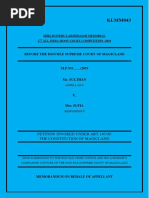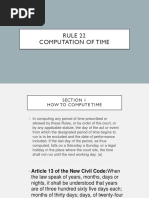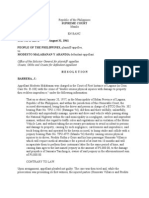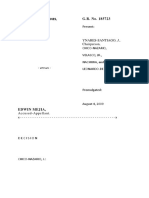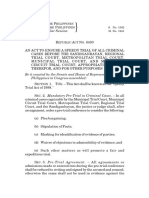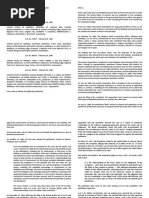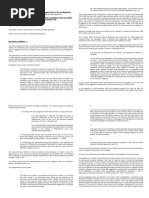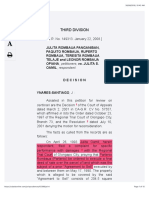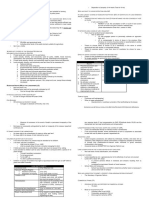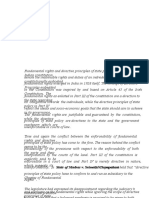Rule 118 Pre Trial
Rule 118 Pre Trial
Uploaded by
blessaraynesCopyright:
Available Formats
Rule 118 Pre Trial
Rule 118 Pre Trial
Uploaded by
blessaraynesOriginal Description:
Copyright
Available Formats
Share this document
Did you find this document useful?
Is this content inappropriate?
Copyright:
Available Formats
Rule 118 Pre Trial
Rule 118 Pre Trial
Uploaded by
blessaraynesCopyright:
Available Formats
Review on the 2000 Revised Rules on Criminal
Procedure 2002 Edition
Rule 118 Pre-trial
Rule 118
PRE-TRIAL
SECTION 1. Pre-trial; mandatory in criminal cases. - In all criminal cases cognizable
by the Sandiganbayan, Regional Trial Court, Metropolitan Trial Court, Municipal Trial
Court in Cities, Municipal Trial Court and Municipal Circuit Trial Court, the court
shall, after arraignment and within thirty (30) days from the date the court acquires
jurisdiction over the person of the accused, unless a shorter period is provided for in
special laws or circulars of the Supreme Court, order a pre-trial conference to consider
the following:
(a) plea bargaining;
(b) stipulation of facts;
(c) marking for identification of evidence of the parties;
(d) waiver of objections to admissibility of evidence;
(e) modification of the order of trial if the accused admits the charge but interposes
a lawful defense; and
(f) such matters as will promote a fair and expeditious trial of the criminal and civil
aspects of the case. (secs. 2 and 3, cir. 38-98)
One thing you have to remember, pre-trial in criminal cases is now MANDATORY as compared to
the 1985 rules. In the prior rules, if the accused and his lawyer will agree. Ngayon parang civil case
na rin - mandatory in all cases cognizable by the Sandiganbayan, RTC, MTC, etc. after arraignment
and within 30 days from the date the court acquires jurisdiction over the person of the accused.
That is why there was a bar question before - how do you distinguish a pre-trial in a criminal case
from a pre-trial in a civil case? And one of the answers there is that pre-trial in a criminal cases is not
mandatory, in civil case it is mandatory. But now, wala na yan. Palitan mo na yan. That answer is
obsolete because of this amendment. You must always see to it that the answers are valid under the
new law. Do not stick to answers given by the UP Law Center - tama man yon at that time. But now
they are changed.
[A] PLEA BARGAINING
Plea Bargaining. That is Section 2 of Rule 116 is all about - yung tawaran tayo, plea of a lesser
offense with the consent of the prosecutor and the offended party.
Now, there is only one EXCEPTION: plea bargaining seems to be prohibited under the Dangerous
Drugs Act, Section 20-A - when you are charged with the violation of the Dangerous Drugs Act and the
imposable penalty is reclusion perpetua to death - no plea bargaining! Bawal!
[B] STIPULATION OF FACTS - meaning, if we can agree on certain facts, so that during the trial we
do not have to prove them anymore.
[C] MARKING FOR IDENTIFICATION OF EVIDENCE OF THE PARTIES - showing of the evidence
already so that during the trial, they can easily be identified.
[D] WAIVER OF OBJECTIONS TO ADMISSIBILITY OF EVIDENCE - we will agree beforehand whether
the evidence is admissible or not.
[E] MODIFICATION OF THE ORDER OF TRIAL IF THE ACCUSED ADMITS THE CHARGE BUT
INTERPOSES A LAWFUL DEFENSE
Paragraph [e] is new - Modification of the order of trial if the accused admits the charge but
interposes a lawful defense. Meaning, I am accused of homicide. I admit I killed him but I acted
in self-defense. Ganun ba? Palitan natin, mauna ka. The prosecution will not present evidence
ahead because anyway you admitted ikaw ang pumatay. This is what we call trial in reverse.
Review on the 2000 Revised Rules on Criminal
Procedure 2002 Edition
Rule 118 Pre-trial
This is because in relation to Section 11[e], Rule 119:
(e) When the accused admits the act or omission charged in the complaint or
information but interposes a lawful defense, the order of trial may be modified.
[F] SUCH MATTERS AS WILL PROMOTE A FAIR AND EXPEDITIOUS TRIAL OF THE CRIMINAL AND
CIVIL ASPECTS OF THE CASE.
Q: Can we discuss in a pre-trial of a criminal case settlement or compromise?
A: Yes - sa civil aspect lang because we know the rule that compromise in the criminal aspect is
not allowed. But if we talk about how to promote a fair and expeditious trial of the criminal aspect, ah
puwede yan. Anyway it has nothing to do with areglo.
SEC. 2. Pre-trial agreement. - All agreements or admissions made or entered during
the pre-trial conference shall be reduced in writing and signed by the accused and
counsel, otherwise, they cannot be used against the accused. The agreements covering
the matters referred to in section 1 of this Rule shall be approved by the court. (sec. 4
cir. 38-98)
Take note, pre-trial agreements or admissions made or entered into the pre-trial conference must
be in writing and signed by the accused and his counsel, otherwise, they cannot be used against the
accused. There is no such provision in civil procedure to that effect.
Q: Now, is this requirement mandatory?
A: YES.
FULE vs. COURT OF APPEALS
162 SCRA 446
FACTS: There were some stipulations made during the trial: Is this your check? Yes,
that is my check. Did you issue it to the complainant? Ah yes - admitted! You knew it was
not funded? Yes, I know! That the check bounced? Yes - admitted! Ganun? OK,
convicted ka!
HELD: The conviction is not valid because the accused did not sign his admissions.
Do not confuse the case of Fule with the case of
PEOPLE vs. HERNANDEZ
260 SCRA 25, July 30, 1996
ISSUE: Are the agreements or stipulations made during the trial (not pre-trial) without
being signed by the party binding on the accused?
HELD: YES because iba ang rules sa trial compared sa pre-trial. If the lawyer makes an
admissions during the trial we follow the general rule - you are bound. The lawyer
represents the client. There is no need for the client to agree or sign anything.
An attorney who is employed to manage a party's conduct of a lawsuit has prima facie
authority to make relevant admissions by pleadings, by oral or written stipulation, which
unless allowed to be withdrawn are conclusive. In fact, judicial admissions are frequently
those of counsel or of the attorney of record, who is, for the purpose of the trial, the agent
of his client. When such admissions are made for the purpose of dispensing with proof of
some fact, they bind the client, whether made during, or even after, the trial."
The foregoing find basis in the general rule that a client bound by the acts of his
counsel who represents him. For all intents and purposes, the acts of a lawyer in the
defense of a case are the acts of his client.
Review on the 2000 Revised Rules on Criminal
Procedure 2002 Edition
Rule 118 Pre-trial
The last sentence is new: The agreements covering the matters referred to in section 1 of this Rule
shall be approved by the court.
SEC. 3. Non-appearance at pre-trial conference. - If the counsel for the accused or
the prosecutor does not appear at the pre-trial conference and does not offer an
acceptable excuse for his lack of cooperation, the court may impose proper sanctions or
penalties. (sec. 5, cir. 38-98)
Section 3, bago rin ito. Here, it is not the party who is penalized, but the lawyer - if the counsel of
the accused or the prosecutor does not appear in the pre-trial conference and there is no offer.
SEC. 4. Pre-trial order. - After the pre-trial conference, the court shall issue an order
reciting the actions taken, the facts stipulated, and evidence marked. Such order shall
bind the parties, limit the trial to matters not disposed of, and control the course f the
action during the trial, unless modified by the court to prevent manifest injustice. (3)
So after the trial, the court will issue a pre-trial order where it will summarize what matter had
been agreed upon; what are the issues; the elements that had been established; facts stipulated; and
exhibits that had been marked.
Now, before we leave this rule, please review the provisions on Katarungang Pambarangay Law on
the provisions of conciliation in the barangay of criminal cases - penalty not more than one year.
MANDATORY man yan ba!
In other words, that is one way of saying indirectly, compromise in criminal cases is now allowed.
That is an instance where an offer of a compromise in a criminal case is not an implied admission of
guilt.
[The following discussions on the Katarungang Pambaranggay are taken in 1996 Criminal Procedure
Transcription:]
In connection with Rule 118, you must be aware of another law which is closely related to the
subject matter of Pre-Trial. What we will discuss is the Katarungang Pambarangay Law which is
applicable to both criminal and civil cases. This law used to be PD 1508 which was already repealed.
The new law on Katarungang Pambaranggay is from Section 399 to Section 422 of the Local
Government Code of 1991 [R.A. 7160] which took effect last January 1, 1992.
Under this law, you cannot file the case directly in court or with the fiscals office without first
trying to settle things with the Lupong Tagapamayapa which is headed by the Barangay Captain. If
thee case is not settled at this level, that is the time the Barangay Captain would say, We will bring
this matter to court.
The law applies only to the following instances:
1) When the case is between natural persons; (does not apply to corporations and the like)
2)
3) When the offended party and the accused reside in the same city or municipality; (not
necessarily in the same barangay)
Example: B is from Bunawan and he sued T who is from Toril. The barangays are
from one end to the other. Is there are need for B to comply with the Barangay Law?
YES because they are of the same city, and under the law, the venue is the residence of
the respondent or accused.
3) When the crime is punishable by imprisonment NOT EXCEEDING ONE YEAR or fine ot
exceeding P5,000. (case is cognizable by the MTC)
The Katarungang Pambarangay does not apply to the following cases:
Review on the 2000 Revised Rules on Criminal
Procedure 2002 Edition
Rule 118 Pre-trial
1) Where there is no private offended party (e.g. illegal possession of firearms)
2) In criminal cases where the accused is under police custody or detention (This is the so-called
inquest, after a valid warrantless arrest.)
In these two latter instances, the case can be filed directly in court without going through the
conciliation process. Where these rules apply, there must be a certification that you have first tried to
settle matters in the barangay.
The Supreme Court has issued a circular on the applicability of the Barangay Law: Administrative
Circular No. 14-93 dated July 15, 1993 where the SC laid down all the guidelines for the
implementation of the Katarungang Pambarangay Law.
[End of the 1996 transcription. The following notes are taken from A Laymens Guide To Court
Procedure, A Handbook On Lawsuits by Neomi T. Olivares and Justice Jose Y. Feria, pp.63-65]:
KATARUNGANG PAMBARANGAY
Katarungang Pambarangay is the system which promotes and implements t he amicable settlement
of disputes at the barangay level before resorting to filing cases in court or in any other government
office. It was first established by Presidential Decree 1508 (signed into law on June 1978, now
superseded by sections 399 to 422 of R.A. 7160, otherwise known as the Local Government Code of
1991.)
Only individuals actually residing in the same barangay, city or municipality can be parties to the
proceedings. Corporations, partnerships, and other juridical entities are not covered by R.A. 7160.
Each barangay constitutes a body know as LUPONG TAGAPAMAYAPA (hereinafter referred to as
LUPON) which administers the conciliation or arbitration process. A Lupon is composed of 10 to 20
members chosen from the community and is headed by the Barangay Captain. Disputes brought
before the Lupon are resolved by a conciliation panel known as PANGKAT NG TAGAPAGKASUNDO
(hereinafter referred to as PANGKAT), consisting of 3 members chosen by agreement between the
disputing parties from the list of the membership of the LUPON.
In all proceedings, parties appear in person without the assistance of counsel or representative,
with the exception of minors and physically or mentally handicapped people who may be assisted by
their nest of kin (who are not lawyers). Refusal or willful failure to appear in compliance with the
barangay summons may result in barring:
The complainant from seeking recourse in the courts for the same cause of action; or
The respondent from filing any counterclaim connected therewith.
Proceedings are public and informal, except for those cases which require the exclusion of the
public in the interest of public decency or morals.
CASES NOT SUBJECT TO AMICABLE SETTLEMENT AT THE
KATARUNGANG PAMBARANGAY:
1) Where one party is the government or a subdivision or instrumentality thereof;
2) Where one party is a public officer or employee, and the dispute relates to the performance
of his official function;
3) Offenses punishable by imprisonment exceeding one year or a fine exceeding PhP 5,000;
4) Offenses where there is no private offended party.
DISPUTES NOT COVERED BY THE AUTHORITY OF THE LUPON
1) Those involving parties who reside in barangays of different cities or municipalities unless
their barangays are adjoining.
2) Those involving real property located in different cities or municipalities.
Review on the 2000 Revised Rules on Criminal
Procedure 2002 Edition
Rule 118 Pre-trial
In both cases, the parties may agree to submit their differences for amicable settlement by an
appropriate Lupon.
Conciliation proceedings at the barangay level are a pre-condition to filing an action in court or a
government office. Non-compliance with this requisite may result in the dismissal of the complaint.
PARTIES MAY FOREGO THE BARANGAY CONCILIATION PROCESS AND GO
DIRECTLY TO THE COURT WHEN:
1) The accused is under detention.
2) Habeas corpus proceedings are called for.
3) Actions are accompanied by provisional remedies such as preliminary injunction,
attachment, delivery of personal property, etc.
4) Legal action is barred by the Statute of Limitations (the law that bars the institution of an
action after the lapse of a prescribed period.)
== end ==
July 15, 1993
ADMINISTRATIVE CIRCULAR NO. 14-93
Subject : Guidelines on the Katarungang Pambarangay conciliation procedure to
prevent circumvention of the Revised Katarungang Pambarangay Law
(Sections 399-422, chapter VII, Title I, Book III, R.A. 7160, otherwise
known as the Local Government Code of 1991).
To : All Regional Trial Courts, Metropolitan Trial Courts, Municipal Trial Courts and
Municipal Circuit Trial Courts
The Revised Katarungang Pambarangay Law under R.A. 7160, otherwise known as
the Local Government Code of 1991, effective on January 1, 1992, and which repealed
P.D. 1508, introduced substantial changes not only in the authority granted to the
Lupon Tagapamayapa but also in the procedure to be observed in the settlement of
disputes within the authority of the Lupon. cd i
In order that the laudable purpose of the law may not subverted and its
effectiveness undermined by indiscriminate, improper and/or premature issuance of
certifications to file actions in court by the Lupon or Pangkat Secretaries, attested by
the Lupon/Pangkat Chairmen, respectively, the following guidelines are hereby issued
for the information of trial court judges in cases brought before them coming from the
Barangays:
I. All disputes are subject to Barangay conciliation pursuant to the Revised
Katarungang Pambarangay Law (formerly P.D. 1508, repealed and now replaced by
Secs. 399-422, Chapter VII, Title I, Book III, and Sec. 515, Title I, Book IV, R.A. 7160,
otherwise known as the Local Government Code of 1991), and prior recourse thereto
is a pre-condition before filing a complaint in court or any government offices,
EXCEPT in the following disputes:
1.
2.
3.
4.
Where one party is the government, or any subdivision or instrumentality
thereof;
Where one party is a public officer or employee, and the dispute relates to
the performance of his official functions;
Where the dispute involves real properties located in different cities and
municipalities, unless the parties thereto agree to submit their difference to
amicable settlement by an appropriate Lupon;
Any complaint by or against corporations, partnerships or juridical entities,
since only individuals shall be parties to Barangay conciliation proceedings
Review on the 2000 Revised Rules on Criminal
Procedure 2002 Edition
Rule 118 Pre-trial
either as complainants or respondents (Sec. 1, Rule VI, Katarungang
Pambarangay Rules);
NOTE: Only natural persons can undergo barangay conciliation.
Disputes involving parties who actually reside in barangays of different
cities or municipalities, except where such barangay units adjoin each other
and the parties thereto agree to submit their differences to amicable
settlement by an appropriate Lupon;
6. Offenses for which the law prescribes a maximum penalty of imprisonment
exceeding one (1) year or a fine over five thousand pesos (P5,000.00);
7. Offenses where there is no private offended party;
8. Disputes where urgent legal action is necessary to prevent injustice from
being committed or further continued, specifically the following:
NOTE: Urgently. A good example in civil action is where the action is
coupled with a provisional remedy such as preliminary injunction, attachment,
replevin or support. Or, actions which may be barred by the statute of
limitations.
5.
a) Criminal cases where accused is under police custody or detention (See Sec.
412 (b)(1), Revised Katarungang Pambarangay Law);
b) Petitions for habeas corpus by a person illegally deprived of his rightful
custody over another or a person illegally deprived of his liberty or one acting
in his behalf;
c) Actions coupled with provisional remedies such as preliminary injunction,
attachment, delivery of personal property and support during the pendency
of the action; and
d) Actions which may be barred by the Statute of Limitations.
Any class of disputes which the President may determine in the interest of
justice or upon the recommendation of the Secretary of Justice;
10. Where the dispute arises from the Comprehensive Agrarian Reform Law
(CARL) (Secs. 46 & 47, R.A. 6657);
11. Labor disputes or controversies arising from employer-employee relations
(Montoya vs. Escayo, et al., 171 SCRA 442; Art. 226, Labor Code, as
amended, which grants original and exclusive jurisdiction over conciliation
and mediation of disputes, grievances or problems to certain offices of the
Department of Labor and Employment);
NOTE: In the case of Montoya vs. Escayo (171 SCRA 442), the
conciliation there is in the Department of Labor.
9.
12. Actions to annul judgment upon a compromise, which may be filed directly
in court (See Sanchez vs. Tupaz, 158 SCRA 459).
II. Under the provisions of R.A. 7160 on Katarungang Pambarangay conciliation, as
implemented by the Katarungang Pambarangay Rules and Regulations promulgated by
the Secretary of Justice, the certification for filing a complaint in court or any
government office shall be issued by Barangay authorities only upon compliance with
the following requirements: aisa dc
1)
2)
Issued by the Lupon Secretary and attested by the Lupon Chairman
(Punong Barangay), certifying that a confrontation of the parties has taken
place and that a conciliation or settlement has been reached, but the same
has been subsequently repudiated (Sec. 412, Revised Katarungang
Pambarangay Law; Sec. 2[h], Rule III, Katarungang Pambarangay Rules);
Issued by the Pangkat Secretary and attested by the Pangkat Chairman,
certifying that:
Review on the 2000 Revised Rules on Criminal
Procedure 2002 Edition
Rule 118 Pre-trial
a. a confrontation of the parties took place but no conciliation/settlement
has been reached (Sec. 4[f], Rule III, Katarungang Pambarangay Rules; or
b. that no personal confrontation took place before the Pangkat through no
fault of the complainant (Sec. 4[f], Rule III, Katarungang Pambarangay
Rules).
3)
4)
Issued by the Punong Barangay, as requested by the proper party on the
ground of failure of settlement where the dispute involves members of the
same indigenous cultural community, which shall be settled in accordance
with the customs and traditions of that particular cultural community, or
where one or more of the parties to the aforesaid dispute belong to the
minority and the parties mutually agreed to submit their dispute to the
indigenous system of amicable settlement, and there has been no
settlement as certified by the datu or tribal leader or elder to the Punong
Barangay of the place of settlement (Secs. 1, 4, & 5, Rule IX, Katarungang
Pambarangay Rules); and
If mediation or conciliation efforts before the Punong Barangay proved
unsuccessful, there having been no agreement to arbitrate (Sec. 410 [b],
Revised Rule Katarungang Pambarangay Lay; Sec. 1, c, (1), Rule III,
Katarungang Pambarangay Rules), or where the respondent fails to appear
at the mediation proceeding before the Punong Barangay (3rd par. Sec. 8, a,
Rule VI, Katarungang Pambarangay Rules), the Punong Barangay shall not
cause the issuance of this stage of a certification to file action, because it is
now mandatory for him to constitute the Pangkat before whom mediation,
conciliation, or arbitration proceedings shall be held.
III. All complaints and/or informations filed or raffled to your sala/branch of the
Regional Trial Court, Metropolitan Trial Court or Municipal Trial Court shall be
carefully read and scrutinized to determine if there has been compliance with prior
Barangay conciliation procedure under the Revised Katarungang Pambarangay Law and
its Implementing Rules and Regulations, as a pre-condition to judicial action,
particularly whether the certification to file action attached to the records of the case
comply with the requirements hereinabove enumerated in par. II;
IV. A case filed in court without compliance with prior Barangay conciliation which
is a pre-condition for formal adjudication (Sec. 412[a] of the Revised Katarungang
Pambarangay Law)
1)
2)
may be dismissed upon motion of defendant/s, not for lack of jurisdiction of
the court but for failure to state a cause of action or prematurity (Royales vs.
IAC, 127 SCRA 470; Gonzales vs. CA, 151 SCRA 289), or
the court may suspend proceedings upon petition of any party under Sec. 1,
Rule 21 of the Rules of Court; and refer the case motu propio to the
appropriate Barangay authority, applying by analogy Sec. 408[g], 2nd par., of
the Revised Katarungang Pambarangay Law which reads as follows:
"The Court in which non-criminal cases not falling within the
authority of the Lupon under this Code are filed may at any time before
trial, motu proprio refer the case to the Lupon concerned for amicable
settlement.
Strict observance of these guidelines is enjoined. This Administrative Circular shall
be effective immediately.
Manila, Philippines. July 15, 1993.
(Sgd.) ANDRES R. NARVASA
Chief Justice
Review on the 2000 Revised Rules on Criminal
Procedure 2002 Edition
Rule 118 Pre-trial
editor-in-chief: mortmort editors: jayceebelle balite j-j torres michael peloton maying dadula
jessamyn agustin lyle santos paul ryan ongkingco dynn gutierrez maya quitain riezl locsin
patrick tabar maritess gonzales maricel culpable kenneth leyva jenny namoc ferdinand vido
melissa suarez rayda sullano rucel cayetano rod quiachon hannah examen myra montecalvo
genie salvaa grace salesa leo gillesania gemma betonio jenny aquiatan michael pito karen
de leon elma tormon judee uy pao angeles jet pascua contributing editors: bathsheba baldoza
marlo masangkay
_-----_ _
/
/
\/ \
/ / / / /| \\
| // / / /\\\|
\ / /\////^ \/
(| __
__ |)
|
|
|
'--'
|
\
-/
\ ____ /
SPACE-FILLER #6:
A friend and I were shopping for dresses for her threeyear-old girls to wear to a wedding. In the shop, another girl
staring intently at Sarah and Becky asked, Are those girls
twins?
Actually theyre triplets, I explained. They have a
brother at home.
Wow, she replied. They sure look like twins to me.
Source: Readers Digest, November 2000
You might also like
- KL University AppellantDocument22 pagesKL University Appellantraghuath88% (8)
- Motion For Reinvestigation ResoDocument2 pagesMotion For Reinvestigation ResoLzl Bastes100% (11)
- Matchplan (M) SDN BHD & Anor v. William D Sinrich & Anor (2004) 2 MLJ 424Document23 pagesMatchplan (M) SDN BHD & Anor v. William D Sinrich & Anor (2004) 2 MLJ 424karkincheongNo ratings yet
- Criminal Procedure Rule 110 SummaryDocument9 pagesCriminal Procedure Rule 110 SummaryDessa Ruth Reyes100% (1)
- Land Titles and ForgeryDocument23 pagesLand Titles and ForgeryblessaraynesNo ratings yet
- Pre-Trial JDR PMCDocument3 pagesPre-Trial JDR PMCTokie TokiNo ratings yet
- BailDocument21 pagesBailVanillaSkyIIINo ratings yet
- Crimpro Recent SC DecisionsDocument5 pagesCrimpro Recent SC DecisionsiamyniNo ratings yet
- Rule 118Document1 pageRule 118Carlos JamesNo ratings yet
- Criminal Procedure Cases 2024Document32 pagesCriminal Procedure Cases 2024Ammar KattoulaNo ratings yet
- Rule 116 CasesDocument55 pagesRule 116 CasesBret MonsantoNo ratings yet
- Rule 22 Computation of TimeDocument10 pagesRule 22 Computation of TimeEman EsmerNo ratings yet
- Preliminary Investigation CasesDocument3 pagesPreliminary Investigation CasesAngel NavarrozaNo ratings yet
- Wood Technology Corp v. Equitable Bank G.R. 153867Document6 pagesWood Technology Corp v. Equitable Bank G.R. 153867Dino Bernard LapitanNo ratings yet
- Special Penal Laws PPDocument199 pagesSpecial Penal Laws PPBenjamin TanNo ratings yet
- Rule 132 Presentation of EvidenceDocument17 pagesRule 132 Presentation of EvidenceKristoffer Lawrence AvenidoNo ratings yet
- Amion vs. TiongsonDocument4 pagesAmion vs. Tiongsonlucky javellanaNo ratings yet
- A.M. No. 12-8-8-SC - Judicial Affidavit RuleDocument10 pagesA.M. No. 12-8-8-SC - Judicial Affidavit RuleasdfNo ratings yet
- Rule 124 Procedure in The CADocument4 pagesRule 124 Procedure in The CAJalieca Lumbria GadongNo ratings yet
- Ong Vs GenioDocument3 pagesOng Vs GenioJuveren Jonald Bowat MendozaNo ratings yet
- N) People vs. Malabanan, Aug. 31, 1961 (Case)Document3 pagesN) People vs. Malabanan, Aug. 31, 1961 (Case)jusang16No ratings yet
- Term Paper in Legal ResearchDocument7 pagesTerm Paper in Legal ResearchClaudine JaelNo ratings yet
- People Vs MejiaDocument25 pagesPeople Vs MejiaRLO1No ratings yet
- Kalaw v. Fernandez (GR 166357) - January 14, 2015Document19 pagesKalaw v. Fernandez (GR 166357) - January 14, 2015James CapellanNo ratings yet
- Moreno V ComelecDocument9 pagesMoreno V ComelecraykarloBNo ratings yet
- Absent During PromulgationDocument8 pagesAbsent During Promulgationjude plataNo ratings yet
- Rule 122Document5 pagesRule 122KC ToraynoNo ratings yet
- Revised Rules On Summary ProcedureDocument6 pagesRevised Rules On Summary ProcedureHaze Q.No ratings yet
- Petition For Correction of Erroneous Entry in Registry RecordsDocument2 pagesPetition For Correction of Erroneous Entry in Registry RecordsJudy Ann ShengNo ratings yet
- Adonis v. Tesoro (Habeas Corpuz)Document5 pagesAdonis v. Tesoro (Habeas Corpuz)Melencio Silverio FaustinoNo ratings yet
- Rura Vs LopenaDocument2 pagesRura Vs LopenaJustin HarrisNo ratings yet
- 2 Kinds of Probable CauseDocument26 pages2 Kinds of Probable CauseGail BrzNo ratings yet
- People V VillaramaDocument3 pagesPeople V VillaramaMaureen Anne dela CruzNo ratings yet
- Estolas Vs Mabalot, 381 SCRA 702Document1 pageEstolas Vs Mabalot, 381 SCRA 702Leonard GarciaNo ratings yet
- Benguet Management Corporation V. CaDocument6 pagesBenguet Management Corporation V. CaPhilAeonNo ratings yet
- Rule 117 CasesDocument63 pagesRule 117 CasesPre PacionelaNo ratings yet
- Bail Tejano Vs Marigomen FCDocument3 pagesBail Tejano Vs Marigomen FCCayen Cervancia CabiguenNo ratings yet
- Jacob vs. CA - 224 S 189Document2 pagesJacob vs. CA - 224 S 189Zesyl Avigail FranciscoNo ratings yet
- Bellen, Honey Joy M. Remedial Law I Reviewer Rules 115 - 120Document3 pagesBellen, Honey Joy M. Remedial Law I Reviewer Rules 115 - 120Honey Joy MBNo ratings yet
- Legal Separation CasesDocument6 pagesLegal Separation CasesNhaz PasandalanNo ratings yet
- Continuous Trial NotesDocument10 pagesContinuous Trial NotesJerome AzarconNo ratings yet
- AAA vs. CARBONELLDocument7 pagesAAA vs. CARBONELLjrsantos_01No ratings yet
- Galvez vs. CADocument11 pagesGalvez vs. CAJoyce VillanuevaNo ratings yet
- Ra 7610 NotesDocument2 pagesRa 7610 NotesKayeNo ratings yet
- Central Mindanao University Vs Republic Full TextDocument67 pagesCentral Mindanao University Vs Republic Full TextErnest Talingdan CastroNo ratings yet
- Crim Pro Cases Prejudicial QuestionsDocument71 pagesCrim Pro Cases Prejudicial QuestionsJocelyn Yemyem Mantilla Veloso100% (1)
- Disbarment - Legal and JudicialDocument1 pageDisbarment - Legal and JudicialAdam Cuenca100% (1)
- (To The Plaintiff'S Formal Offer of Documentary Exhibits) : CommentDocument3 pages(To The Plaintiff'S Formal Offer of Documentary Exhibits) : Commentanon_991584093No ratings yet
- 69 Bangayan JR v. BangayanDocument2 pages69 Bangayan JR v. BangayanNinaNo ratings yet
- Presentation of Oral EvidenceDocument14 pagesPresentation of Oral EvidenceABDOULIENo ratings yet
- Report - Forcible Entry PraccourtDocument6 pagesReport - Forcible Entry PraccourtJosiah DavidNo ratings yet
- 15A.1Recognition of Foreign Divorce Decree by Philippine CourtsDocument3 pages15A.1Recognition of Foreign Divorce Decree by Philippine Courtscertiorari19No ratings yet
- Speedy Trial ActDocument8 pagesSpeedy Trial ActTheSupplier ShopNo ratings yet
- ESTRADA V SandinganbayanDocument24 pagesESTRADA V SandinganbayanJoyleen HebronNo ratings yet
- Eusebio V PeopleDocument7 pagesEusebio V PeopleArgel Joseph CosmeNo ratings yet
- Revised Rules On Summary ProcedureDocument3 pagesRevised Rules On Summary ProcedurejhovesilaganNo ratings yet
- The Case. - FactsDocument2 pagesThe Case. - Factslucky javellanaNo ratings yet
- CREATE Bill RA No. 11534 Final VersionDocument8 pagesCREATE Bill RA No. 11534 Final Versionericka maeNo ratings yet
- Ngo Bun Tiong vs. Judge Sayo 163 Scra 237Document10 pagesNgo Bun Tiong vs. Judge Sayo 163 Scra 237albemart100% (1)
- Gutierrez v. Collado PC IDocument6 pagesGutierrez v. Collado PC IJenniferPizarrasCadiz-CarullaNo ratings yet
- CIVPRO Reviewer Rule 13Document12 pagesCIVPRO Reviewer Rule 13Jay-Arh Martirez SaliseNo ratings yet
- Vicente Del Rosario y Nicolas, Petitioner, vs. People of The PhilippinesDocument13 pagesVicente Del Rosario y Nicolas, Petitioner, vs. People of The PhilippinesJames Jake ParkerNo ratings yet
- People of The Philippines vs. Antonio Magat y Londonio G.R. 130026 May 31,2000Document2 pagesPeople of The Philippines vs. Antonio Magat y Londonio G.R. 130026 May 31,2000Clarisse Sator100% (1)
- Rule 118 Pre TrialDocument7 pagesRule 118 Pre TrialJade TanggaanNo ratings yet
- 7 Eastern Shipping Lines vs. CA, 234 SCRA 78Document21 pages7 Eastern Shipping Lines vs. CA, 234 SCRA 78blessaraynesNo ratings yet
- 2 Fabre Vs CA G.R. No. 111127Document15 pages2 Fabre Vs CA G.R. No. 111127blessaraynesNo ratings yet
- 19 Delsan Transport Lines vs. American Home Assurance, G.R. 149019Document10 pages19 Delsan Transport Lines vs. American Home Assurance, G.R. 149019blessaraynesNo ratings yet
- 1 San Luis Vs San Luis GR 133743Document21 pages1 San Luis Vs San Luis GR 133743blessaraynesNo ratings yet
- 1 Baliwag Transit Vs CA 256 Scra 746Document11 pages1 Baliwag Transit Vs CA 256 Scra 746blessaraynesNo ratings yet
- 17 FGU Insurance vs. CA, G.R. No. 137775Document19 pages17 FGU Insurance vs. CA, G.R. No. 137775blessaraynesNo ratings yet
- 9 Spouses Cruz vs. Sun Holidays, Inc., G.R. No. 186312Document15 pages9 Spouses Cruz vs. Sun Holidays, Inc., G.R. No. 186312blessaraynesNo ratings yet
- 2 Belgian Overseas Chartering vs. Phil. First Insurance, 383 SCRA 23Document24 pages2 Belgian Overseas Chartering vs. Phil. First Insurance, 383 SCRA 23blessaraynesNo ratings yet
- 15 Caltex (Philippines), Inc. vs. Sulpicio Lines, Inc., 315 SCRA 709Document17 pages15 Caltex (Philippines), Inc. vs. Sulpicio Lines, Inc., 315 SCRA 709blessaraynesNo ratings yet
- 8 Cebu Salvage vs. Philippine Home Assurance, G.R. No. 150403Document10 pages8 Cebu Salvage vs. Philippine Home Assurance, G.R. No. 150403blessaraynes0% (1)
- 11 Loadstar Shipping Co. vs. CA, 315 SCRA 339Document13 pages11 Loadstar Shipping Co. vs. CA, 315 SCRA 339blessaraynesNo ratings yet
- Union Security ClauseDocument2 pagesUnion Security ClauseblessaraynesNo ratings yet
- 4 Eastern Shipping Lines vs. BPI - MS Insurance Corp. & Mitsuo Sumimtomo, G.R. No. 182864Document26 pages4 Eastern Shipping Lines vs. BPI - MS Insurance Corp. & Mitsuo Sumimtomo, G.R. No. 182864blessaraynes100% (1)
- Unfair Labor PracticeDocument2 pagesUnfair Labor PracticeblessaraynesNo ratings yet
- 1 Eastern Australian vs. Great American, 108 SCRA 248Document10 pages1 Eastern Australian vs. Great American, 108 SCRA 248blessaraynesNo ratings yet
- 1 de Guzman vs. CA, G.R. No. L-47822Document12 pages1 de Guzman vs. CA, G.R. No. L-47822blessaraynesNo ratings yet
- List of Bir FormsDocument49 pagesList of Bir Formsblessaraynes50% (4)
- Pal Vs NLRC GR 120567 Case DigestDocument2 pagesPal Vs NLRC GR 120567 Case Digestblessaraynes100% (1)
- Tax Assessments Burden of ProofDocument3 pagesTax Assessments Burden of ProofblessaraynesNo ratings yet
- LTD All CasesDocument158 pagesLTD All CasesblessaraynesNo ratings yet
- Rule 120 JudgmentDocument12 pagesRule 120 JudgmentblessaraynesNo ratings yet
- Ethics Complaint FINALDocument69 pagesEthics Complaint FINALBoulder City ReviewNo ratings yet
- Statutory Interpretation 178 Notes FinalDocument35 pagesStatutory Interpretation 178 Notes FinalAndziso CairoNo ratings yet
- Ucc 1-207 Authors - Howard FreemanDocument30 pagesUcc 1-207 Authors - Howard FreemanWarriorpoetNo ratings yet
- Answer Ni DennisDocument4 pagesAnswer Ni DennisDennis SaquingNo ratings yet
- Facts: Palko Was Indicted For The Crime of First Degree Murder, But at Trial TheDocument10 pagesFacts: Palko Was Indicted For The Crime of First Degree Murder, But at Trial ThejarabboNo ratings yet
- Republic of The Philippines Manila en Banc: Luna, Sison & Manas Law Office For PetitionersDocument8 pagesRepublic of The Philippines Manila en Banc: Luna, Sison & Manas Law Office For PetitionersEnyong LumanlanNo ratings yet
- The Judicial Affidavit RuleDocument20 pagesThe Judicial Affidavit RuleMhay ReyesNo ratings yet
- Maria V. de Gutierrez, Manuel Gutierrez, Abelardo VELASCO, and SATURNINO CORTEZ, Defendants-AppellantsDocument25 pagesMaria V. de Gutierrez, Manuel Gutierrez, Abelardo VELASCO, and SATURNINO CORTEZ, Defendants-Appellantsk santosNo ratings yet
- Examination of WitnessesDocument13 pagesExamination of WitnessesSuchismita BaruaNo ratings yet
- EEOC v. Sidley Austin Brown. - Document No. 14Document45 pagesEEOC v. Sidley Austin Brown. - Document No. 14Justia.comNo ratings yet
- People V DelociembreDocument11 pagesPeople V DelociembreMark Lawrence Lorca FortesNo ratings yet
- Rule 16Document20 pagesRule 16Jepz FlojoNo ratings yet
- G.R. No. 149313 - Panganiban v. OamilDocument15 pagesG.R. No. 149313 - Panganiban v. OamilJaana AlbanoNo ratings yet
- Villena Vs Secretary of The InteriorDocument1 pageVillena Vs Secretary of The InteriorlckdsclNo ratings yet
- United States v. Leon Franco, 11th Cir. (2016)Document5 pagesUnited States v. Leon Franco, 11th Cir. (2016)Scribd Government DocsNo ratings yet
- CARL Reviewer - 1st DraftDocument11 pagesCARL Reviewer - 1st DraftJoyceNo ratings yet
- Crimmins V DC Final OrderDocument8 pagesCrimmins V DC Final OrderTom BridgeNo ratings yet
- BarredoDocument2 pagesBarredoGe LatoNo ratings yet
- Motion For Reconsideration in Court of AppealsDocument2 pagesMotion For Reconsideration in Court of AppealsAnonymous ozurEtuxItNo ratings yet
- G.R. No. 202867 July 15, 2013 People of The Philippines, Appellee, REGIE LABIAGA, Appellant. Carpio, J.Document5 pagesG.R. No. 202867 July 15, 2013 People of The Philippines, Appellee, REGIE LABIAGA, Appellant. Carpio, J.Mark Lester Lee AureNo ratings yet
- Pre-Trial Brief of ProsecutionDocument3 pagesPre-Trial Brief of ProsecutionJoan Pablo0% (1)
- Fundamental Rights and Directive Principles of State Policy As Enshrined in The Indian ConstitutionDocument16 pagesFundamental Rights and Directive Principles of State Policy As Enshrined in The Indian ConstitutionPavitra ShivhareNo ratings yet
- Victory!! Calfornia Man Stops A Foreclosure Using The New California Homeowner Bill of Rights (Hobr) 5-9-2013Document26 pagesVictory!! Calfornia Man Stops A Foreclosure Using The New California Homeowner Bill of Rights (Hobr) 5-9-201383jjmack100% (5)
- Labor Stds. (Wah Yuen - Shie Jie Corp. Digests)Document13 pagesLabor Stds. (Wah Yuen - Shie Jie Corp. Digests)anna beeNo ratings yet
- Michael Padua Vs People of The Philippines GR 168546 (July 23,2008) FactsDocument4 pagesMichael Padua Vs People of The Philippines GR 168546 (July 23,2008) FactsDreiBaduaNo ratings yet
- SCOTUS Supplemental Brief in Zubik From United StatesDocument26 pagesSCOTUS Supplemental Brief in Zubik From United StatesCristian FariasNo ratings yet
- Criminal Law Cases Article 13Document185 pagesCriminal Law Cases Article 13LILIAN CUIZONNo ratings yet
